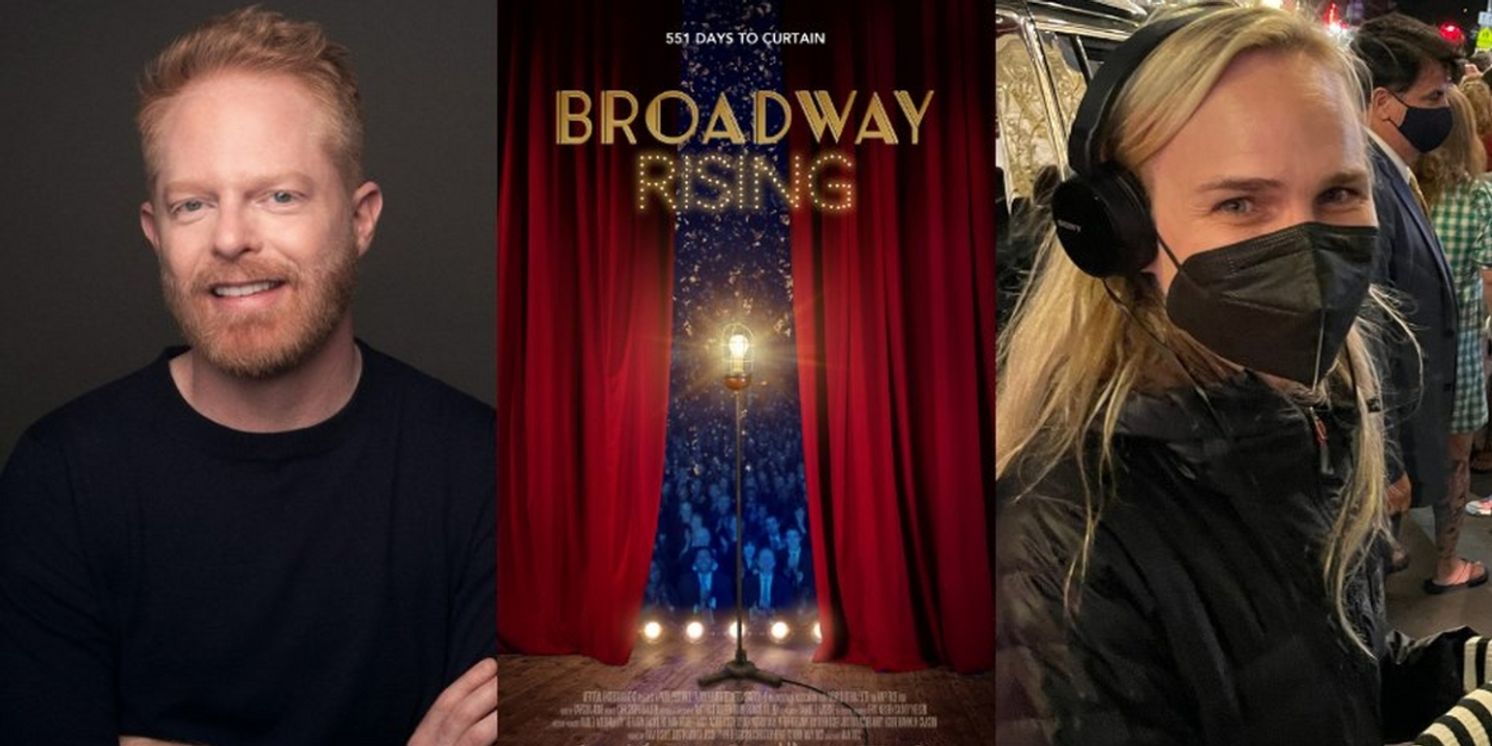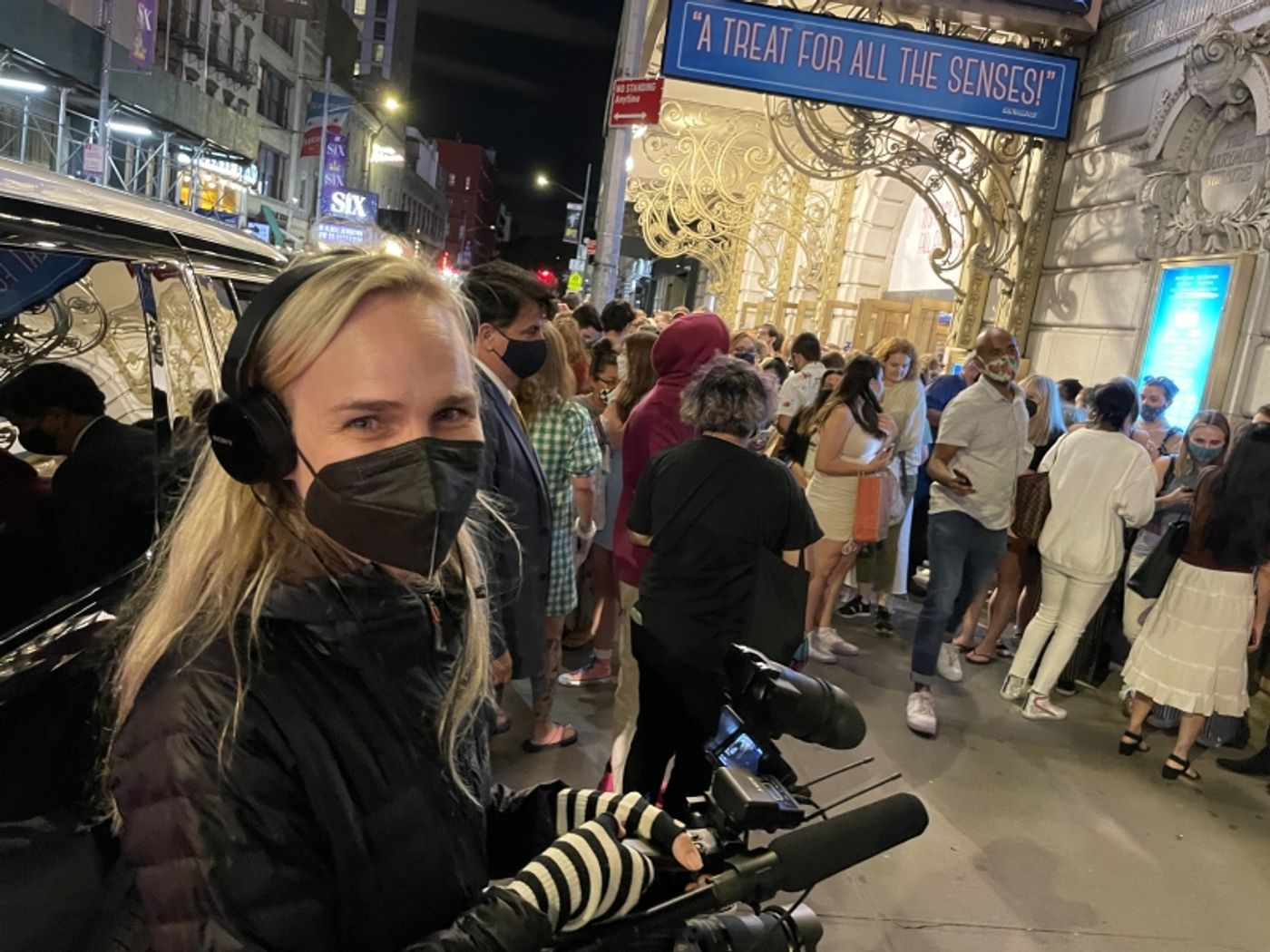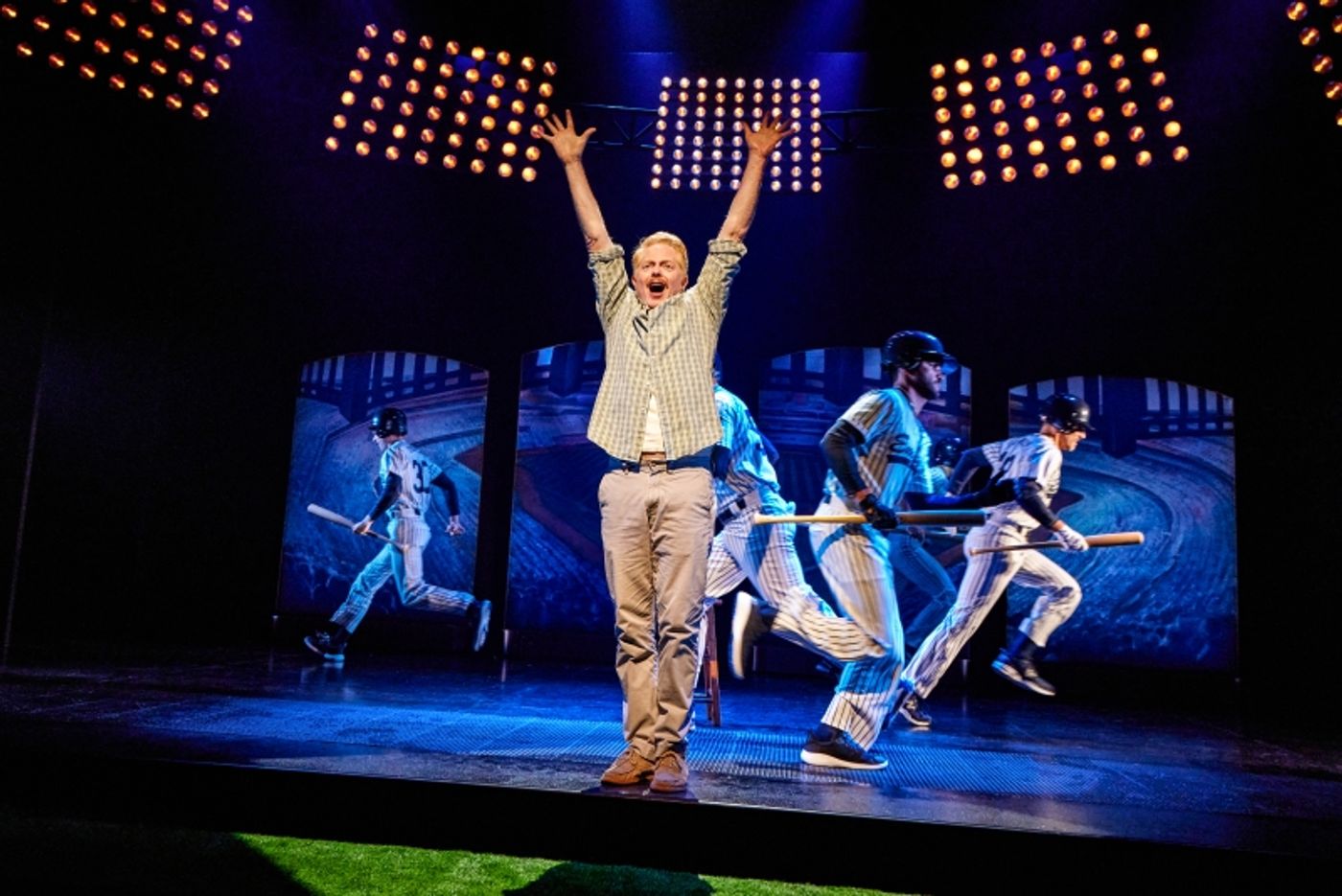Interview: Jesse Tyler Ferguson & Amy Rice on Documenting Broadway's Return In BROADWAY RISING
Broadway Rising will be available on VOD on December 27.

Jesse Tyler Ferguson and Amy Rice have documented the return of Broadway through the documentary Broadway Rising. The film will be available on VOD on December 27.
Directed by Emmy-nominated Rice (HBO's By the People: The Election of Barack Obama, The Newsroom), the feature-length documentary chronicles the Broadway community's harrowing and inspiring journey back to the stage following the COVID-19 shutdown on March 12, 2020.
Over 96,000 people lost their jobs when The Great White Way went dark decimating an entire ecosystem of businesses supporting the industry. From actors to artisans, directors to doormen, producers to prop masters, not one aspect of the business was left untouched. But the show must go on!
BroadwayWorld sat down with Rice and Ferguson to discuss how the documentary originall came about, the current state of Broadway, and what they hope people take away from the film.
How did this documentary originally come about?
Amy Rice: I'm a filmmaker and I've lived in New York for over 20 years and during the Covid quarantine I was in Oklahoma with my family and I desperately missed New York and just watching all the news coverage about what was happening with Covid in New York was so heartbreaking. I knew New York would come back beause New York always comes back. I felt like as a documentary filmmaker, I wanted to help tell the story of New York's come back. I was brainstorming that idea, I was also simultaneously constantly googling "When is Broadway reopening?" Because, you know, I felt like as soon as Broadway reopensm, New York is officially back and I can move back to New York.
As I did that, I just kept reading story after story about how hard hit the Broadway community was and how they persevered through the shutdown. On the day that Broadway shutdown, over 90,000 people lost their jobs and they lost all their side jobs too, in the restaurant world and catering, et cetera. But they were able to find a way to persevere throughout. So I felt like there was no better lens to tell the story of New York's comeback than through Broadway.
So I pitched the idea to Jesse and Justin [Mikita] who I had worked with before and were phenomenal to work with and they have a deep roots and a deep love of Broadway and they immediately jumped on board. Everybody immediately got the idea a d wanted to be a part of it. We started developing it and we just felt like we wanted to tell not only the story of like who do we usually associate with in the Broadway community, which are the performers and the director and the producers, but also the story of the people behind the scenes, the crew and the small businesses and the artisans, that are such an integral part of the community, like the ushers and the stage door security guys and the costumer maker and the epidemiologist, which is now a part of the Broadway team. So really like paint a full picture of the community.
Jesse Tyler Ferguson: Amy is someone that Justin and I have been trying to work with for quite a few years, actually. We have been circling around a few other projects and none of them came fruition. So when Amy called us in the early months of the pandemic and said, "I think we should document Broadway returning," I was like, "Oh, this is like the perfect fit for us." Amy's a brilliant documentarian, but she's kind of an outsider in the Broadway world. She loves seing theater and she's a patron of the arts but Justin and I, we know people on the inside and we're like, "Yeah, so like start connecting you with people."
So it was a no-brainer and it really kind of rolled out pretty quickly and easily once we decided to do it. It was just a matter of like, how are we gonna tell the story and how are we gonna bookend it and what's gonna be the point of view about this at this documentary? It can't just be about Broadway returning from Covid but it really can also act as a love letter to the industry and sort of a peek behind the curtain of how many people it actually takes to create a Broadway show.
Once you had figured out the direction you wanted to go in, how did you begin to curate the documentary interviews and subjects?
Ferguson: It became our objective to cast the net extremely wide and find as many people, not just front facing people in the industry, but also people who you would never think are connected to the Broadway industry, like the dry cleaners up in the Bronx who clean the costumes and the restaurants in Times Square that feed the actors in between shows.
It was very therapeutic to actually be on all these calls with all these people who love and adore Broadway so much in those early months of the pandemic when everything was shut down because we could also commiserate with one another.
Rice: We just wanted to be as inclusive as possible. We wanted to give everybody an opportunity to tell their story. So they would reach out and tell them about the documentary and then we would follow up if they were open to talking with us. That's kind of how we started out. It was a lot. We were trying to really tackle a lot of stories at once but that's just the fun part of documentary filmmaking. You always kind of do that. You really cast the very wide net and then you see where your narrative goes, if you start filming with people. And some people weren't available or because of Covid restrictions. Restrictions made it harder to film with them. We had lots of challenges. We were able to figure out a way. I'm very proud of how it all worked out.

You spoke to so many people and there are so many touching stories included in the documentary. Is there one that has stuck with you the most?
Rice: Oh boy. They're all my babies. It's so very hard. I truly, genuinely love all the subjects that we followed and all their stories and I admire them so very much. I think that Ernie, the stage doorman that we followed. He was one of the first subjects that I talked with. He not only went through loss, losing his mother to Covid, but also his own experience of having Covid. He was just so touched by the outpouring of the Broadway committee when he was out of work and sick and grieving. That was just very touching and very inspiring.
Ferguson: Every time I watch it, I find a different story that I'm sort of struck by. I really appreciate Tom Kirdahy opening up not only his door but his heart to discuss his relationship with Terrence McNally. He's extremely an extremely private person and that is a relationship that I think he keeps very close to his heart and doesn't let a lot of people in on. The entire industry was really shook by Terrence's passing, so the fact that he allowed us to have access to his story really meant so much to me.
With all the people that you spoke to, is there anything that you learned about the community as a whole? Was there a common thread throughout everyone that you interviewed?
Rice: Yes. I just honestly feel like Broadway is filled with such good people. Really, really, really good people. It's a hard, very, very hard industry, where you live paycheck to paycheck, but people are in it because of their deep love of the craft. I thought that was really beautiful. I've worked in Hollywood, in the film industry and there's just something so pure about the art form and Broadway.
I was just surprised, like the lead actress of Wicked, Ginna Claire [Mason], who was opening up Broadway, you would think she's gonna take a fancy car in from New Jersey to the city and she's like riding the train in the subway. Just a very down to Earh, fun, creative community and they're just in it for the art. They're really in it for the art. That as an artist, a filmmaker, I found to be really inspiring. I wanna just want to make documentaries about Broadway.
You mentioned before that there were obviously Covid restrictions in place while you were filming. What were those like and how did you work through those?
Rice: Well every show had different Covid protocols they followed. We kept for a crew very, very small. Like sometimes it was just me with a camera and my producer. So we would always catch before we would see anybody and we were always wearing masks and washing hands and some production wanted us to get a PCR test, some had a rapid test. With my team, my crew, we had to be very careful to make sure we didn't pass it or get sick. Sometimes, we couldn't get into a room because of the Covid protocol, so we would ask people to film with their iPhones and iPhones now film in 4K and they're very high quality and it's very intimate. So I would just give them these questions to answer as they were filming. I couldn't physically be in there with them, but I was literally standing outside the building, texting them, doing what works.
Jesse, you've had the really unique experience of being in the same show during three different stages of Broadway. From your personal experiences, what has it been like to be in a show before the shutdown, then right after the shutdown and now, as Broadway has come back?
Ferguson: We actually never got to open the first time we were just in rehearsal, which I think was actually better for us because my heart was just so broken and shattered that I started that process and had to step away from it. But, you know, this play, I will never in my career ever have so much downtime with a character. It's quite astonishing actually. I think for the entire cast, it produces these really layered, intricate performances because we've had so much time to think about the characters. We've been in an idle mode with these characters longer than we've actually been able to perform them, when all is said and done. That's just incredibly unique and will never happen again, I guarantee you. I mean, no producer in their right mind would say, "Yes, now take eight months off and think about the part." But that's what we got to do. So it is something that will never happen again. But that's why I keep telling myself it's actually a really unique experience, but I can't ever really draw from again, because this is just completely of this moment and I'll never be able to work like this again.
In a lot of ways I'm very happy because it's difficult to take that time off, but in a lot of other ways, I'm a glass half full type guy. I have looked at the fringe benefits of all that downtime as well.

In your opinion, what is the current state of Broadway in terms of how it has recovered from the pandemic?
Ferguson: Oh, I think we're still in a recovery mode. I'm so happy it's back. I'm so happy people are coming to see theater again. I've been disappointed that plays are having a harder time than than musicals. I think people are coming and they're wanting to see a big, splashy musical and listen, I'm a big fan of a musical but I'm also like, there's so many great plays. You look at these Pulitzer Prize winning plays that are on Broadway right now, or plays that have won Tony Awards, like ours, and we're having a hard time finding an audience. It's really heartbreaking. But i'm thrilled that like, you know, people are rushing to see Funny Girl and Music Man and these shows are keeping Broadway healthy.
Broadway's always a mixed bag of different types of things for everyone. I hope that we can get to a point where the industry's in a healthy enough place that some of these plays are given more of a shot because I want playwrights and new writers to not be afraid of coming to Broadway and failing because of the financial situation that we're in right now. I think, with each passing few month it's be getting better. I've been working on Broadway basically since the beginning of the pandemic and through the pandemic and then with this return. I do see that it is getting healthier and the streets are more crowded. I am optimistic that the trend will keep moving forward but yeah, I think we're still in a place where all we're rebuilding.
What is something that you want people to take away from this documentary?
Rice: The theater community and Broadway community is so unbelievably resilient. I think that is such an important part of this story. Our documentary opens with a quote, "Our medicine is in our story." I read along the way that the purest form of human connection through storytelling is live theater. We were robbed of that for 18 months. Storytelling is so important. It's so important to tell everybody's stories because it humanizes us and allows us to heal and move forward. I think that's one of the most important parts of the story.
Ferguson: I really hope that it inspires people to go see a Broadway show but also I think for lovers of theater, I hope that it's revealing as to how deep of a bench it is to put on a Broadway show and how many people have to work so hard in order to get it to that opening night. I think it's a very interesting fly on the wall perspective of the business of Broadway. I think that it's will be really eye-opening to a lot of people who are fans of Broadway, but don't necessarily know all that goes into putting out a Broadway show. For those who don't know a lot about Broadway, I hope it's really inspires them to come see a show and also be a part of this community. It's a very welcoming community and it's here for everyone.
Watch the trailer for Broadway Rising here:
Amy Rice photo: Sam Bisbee / Park Pictures
Jesse Tyler Ferguson Photo: Luke Fontana

Videos

